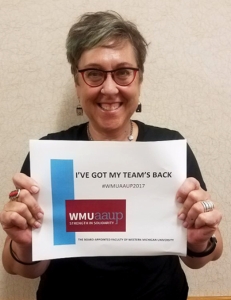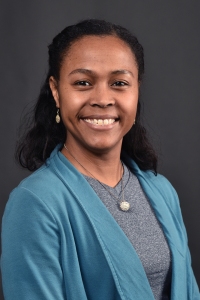This page is no longer being updated. Please click here to visit the new home of the WMU-AAUP chapter blog.
January 2019 WMU-AAUP leadership transition

Leadership Transitions + Lame-Duck Legislation:
The More Things Change… |
Letter to the faculty
from WMU-AAUP President Lisa Minnick (2013-18) |
December 7, 2018 |
Dear colleagues,
Last week when I started thinking about what I would say in this message, I was thinking about how much has changed over the last six years, particularly since December 11, 2012, when Gov. Rick Snyder signed Michigan’s so-called “right to work” (RTW) bills into law. The legislation had been introduced during the lame-duck session that year, amid massive protests outside the Capitol building in Lansing. It passed along party lines without public hearings by a majority party that knew it would not have the votes when the new legislature convened in January 2013.
What I had been thinking last week that I would write about was how far Michigan has come since that terrible, blustery day in Lansing in December 2012, when I protested alongside faculty colleagues and members of WMU’s AFSCME and AFT locals, along with thousands of other people from all across the state. It seemed surreal that this kind of legislation could even be on the table in Michigan, let alone that it could pass. But it did, and here we are.
There will be no turning the clock back on the effects of RTW in Michigan, thanks to the U.S. Supreme Court’s 5-4 decision earlier this year in Janus v. AFSCME Council 31, which effectively nationalized RTW laws. Still, there are all kinds of other ways to improve the labor climate at the state level, provided that there is the political will to make it happen.
We have not seen much of that kind of political will in Lansing in recent years. Many of the values we share as the faculty of a public university, and as union members, have not been priorities for the majority party. Under their legislative and executive leadership, we have seen higher education funding decline and anti-labor legislation proliferate. In addition to RTW, we have witnessed the repeal of Michigan’s prevailing wage laws and ongoing attacks on the rights and benefits of K-12 educators.
But last month, Michigan voters elected an unapologetically pro-labor governor, Gretchen Whitmer. That means starting next month, while we still won’t have a labor-friendly legislature, Lansing will start to feel a little less unfriendly. In last month’s election, the labor-unfriendly folks lost five seats – and their supermajority – in the state Senate and another five seats in the state House. Should they pass anti-union legislation or bills that would harm public higher education in the next session, we can count on Gov. Whitmer to veto it.
There are still any number of challenges ahead of us, I was thinking I would write, on campus and beyond, but for the first time almost a decade, the balance of political power in Michigan feels like it may be moving in a pro-labor, pro-education direction. With significant majorities of voters saying yes last month to the ballot initiatives to end gerrymandering and make voting and registration easier and more accessible, there is good reason for even more optimism in the next few years.
That’s what I was thinking about last week. And it’s all still true. But now that the Michigan legislature’s lame-duck session is underway, things are getting a little more complicated.
As in North Carolina in 2016 and more recently in Wisconsin, Michigan is now also the scene of what appear to be anti-democratic power grabs by a party whose legislative dominance was reduced (although not reversed) and who lost control of the offices of governor, attorney general, and secretary of state when Michigan voters repudiated their candidates last month. They are now using bills introduced in the lame-duck session to try to limit the powers of those offices and also to weaken the anti-gerrymandering and voter-access initiatives, both of which voters favored overwhelmingly last month. Additionally, bills that would harm workers by cutting back planned minimum wage increases and paid sick leave protections have already passed both houses of the legislature and await the outgoing governor’s signature.
Several anti-union bills are also in the lame-duck mix, including Senate Bill 1260, which would require public-sector labor unions (like ours) to hold a recertification election every two years. It appears that the goal of SB 1260 is to try to neutralize union participation in electoral politics. The WMU-AAUP does not fund political candidates or ballot initiatives, so we are not a target for the bill’s sponsors, but that wouldn’t matter if this bill becomes law, because we would see the same increased demands on our resources as any other public-sector union, which would make it harder for us to do the work we are here to do: defend the contract and protect faculty rights.
When we came back to school after the holidays in January 2013, we had no way to know how the RTW laws would affect our chapter or our professional lives as university faculty and union members. Our contract was set to expire on September 5, 2014, after which date Western Michigan University would become a RTW campus.
We know now that we have not only survived RTW but have built significantly on the strength of our chapter and increased faculty engagement in union activities over the past six years. That doesn’t mean RTW wasn’t a serious blow to us after 40 years as an agency shop. It absolutely was. But more than anything, the continuing health and success of our chapter is a tribute to the more than 800 dues-paying members of the WMU-AAUP bargaining unit. Many of you took up the difficult but essential work of old-fashioned, on-the-ground, one-on-one union organizing and helped to plan and roll out our year-long contract campaign for the 2014 negotiation cycle. You’re the reason we’re still here, stronger than ever.
What we learned is that our model worked. Chapters in other states are following it now. They need to because the Janus v. AFSCME decision means that a lot of them are now where we were in 2013. Since RTW, we have had to direct more of our time and more of our chapter resources into organizing, outreach, and retention, no question. But we knew that was what it would take. We made a plan, we got ourselves trained, and most important, we collaborated. In small groups and large, within and across departments and colleges, on campus and in the community, the faculty showed up, had the conversations, and did the work. We did it with the understanding that in this new world of RTW, that work must be ongoing. And it has been.
After the election last month, I felt for the first time in six years a noticeable shift in the political energy in this state and the real possibility that positive change is in the offing. These lame-duck shenanigans, along with word of another anti-union case that is likely to end up in front of the U.S. Supreme Court next year, have been an unwelcome reminder of how vigilant we are still going to have to be. In a country where for most of its history, citizens have mostly been able to count on peaceful transitions of power, these egregious attempted power grabs in North Carolina, Wisconsin, and now Michigan suggest that we may no longer be able to take for granted that the will of the electorate is going to be honored. Additionally, there is still well-funded, well-organized opposition to unions in this country and no chance that they will just give up and stop trying to ban collective action in the workplace and silence the voices of working people. If anything, they are emboldened by a string of recent victories in court and in state legislatures.
So, rather than a farewell message in which I say Yes! We have done all right! We are going to be OK! Things are going to get better! – although I still think all that is true – instead I will sign off my last message to the faculty as WMU-AAUP president with, perhaps appropriately, all things considered, a call to action:
First, we are going to need to be able to count on your continuing vigilance, your help to keep building strength and solidarity, and most of all, your visible and vocal engagement in the union. That means answering the call when you are needed, showing your allegiance proudly and unapologetically, and finding ways to support the organization that fit your schedule, your interests, and your skills. The WMU-AAUP has good work for everyone, a lot of it inspiring and even fun and all of it meaningful. Please plan to do more of it in 2019. (Bonus: It counts as professional service for tenure and promotion.)
Second, and this one’s more urgent: Please call, email, tweet at, post on their Facebook pages, and/or otherwise contact your state legislators and tell them to vote NO on these union-busting, anti-worker, anti-democratic lame-duck bills. Since unfortunately all are likely to pass both houses (at this writing, some already have), please also contact Gov. Rick Snyder and urge him to do the right thing by vetoing these terrible bills. At this point, he is going to be the only one who can stop any of this.
While we’re on the subject of electoral politics, I will say that while I am generally opposed on principle to term limits, I am happy to make an exception in the case of our chapter leadership. Identifying and developing emerging leaders, and then standing back so that they can lead, are essential elements for ensuring the health and evolution of an organization like ours. I am excited about the deep bench of incoming and upcoming chapter leaders and proud of the work we have been doing over the past six years to build it.
In that spirit, I am also very much looking forward to handing over the reins (to coin a phrase) to WMU-AAUP President-elect Carol Weideman when she takes office officially on January 1, 2019. Thanks to Carol, VP-elect Mark St. Martin, and contract officers Robert Trenary and Natalio Ohanna, who will both continue in their positions into the new year, the WMU-AAUP will be in excellent hands going forward. I am excited about the new directions Carol and her team will take us, and I know I can count on all of you to make sure she knows you have her back the way so many of you have always had mine.
It has been a delight to work with Carol, Robert, and Natalio, and with chapter secretary Tim Michael and treasurer Betsy Aller. It has also been a privilege to serve alongside our many other fine officers over the years, all of whom deserve to be recognized by name (and I apologize for not doing that here). The same goes for the dedicated members of the WMU-AAUP Executive Committee, our college-level reps, whose labor on the faculty’s behalf is tireless and indispensable. That is also true of the WMU-AAUP Association Council, our department reps, who are some of the savviest, most engaged union activists on our campus. What a joy it has been to work with you. And speaking of people with whom it is a joy to work, our chapter staff, Susan Esman and Lori Maguire, belong at the top of that list. Their loyalty to the faculty, institutional memory, and just straight-up awesomeness are invaluable to the success of the chapter. They have made my job unimaginably easier in more ways than I can count and probably in more ways than I even realize.
This is not the easiest job in the world and can feel damn near impossible at times. But it also comes with some incredible rewards (alas, not of the remunerative kind). What stands out the most for me is the opportunities I’ve had to meet and work with colleagues in every college and nearly every academic unit, many of whose paths I might never have crossed were it not for this job. I never stop being blown away by the innovative, important, and brilliant work you are doing as researchers, scholars, artists, and teachers; how much you give of yourselves to make sure our students thrive; how quietly, humbly, invisibly, and selflessly you do much of your work as professors; and what extraordinarily wise, thoughtful, generous, and (best of all) incredibly kind human beings you are. I am proud to work alongside you as your faculty colleague, and it has been an honor beyond anything I can express in words to have served as your WMU-AAUP president. Thank you for trusting me with this responsibility and this privilege.
Wishing everyone a joyous and restorative holiday season and a happy, healthy new year.
With gratitude and in solidarity,
Lisa
—
Lisa C. Minnick
President, WMU-AAUP
Guide to lame-duck legislation and contact info for elected officials:
- Anti-union bills (SB 1260, HB 6474, HB 5368):
- Other worker-unfriendly bills (SB 1171 and 1175) that would significantly reduce the previously approved minimum wage increase and paid sick leave requirements:
- Bills to try to strip power from newly elected governor, attorney general, secretary of state, and Board of Education:
- Bills that would weaken voter-approved ballot initiatives:
- Round-ups of some of the lame-duck bills:
- Other lame-duck bills that may be of interest to WMU faculty:
Contact info for elected officials:
- State Senate, District 20 (Kalamazoo Co.): Sen. Margaret O’Brien: (517) 373-5100.
- If you live outside Kalamazoo Co, click here to find contact info for your state senator.
- State house, 60th District (City of Kalamazoo, part of Kalamazoo Township and part of Portage): Rep. Jon Hoadley (517-373-1785). Rep. Hoadley has already voted against bills that would gut the previously approved minimum wage increase and paid sick-leave provisions and told me last week that his vote on SB 1260 is “definitely NO.” He has been a consistent fighter for higher education and labor rights, so please take a minute to give him a call to thank him if you are so inclined.
- State house, 61st District (City of Portage, Townships of Oshtemo, Prairie Ronde, Schoolcraft and Texas): Rep. Brandt Iden (517-373-1774). Rep. Iden has already voted in favor of reducing the minimum wage increase and paid sick-leave requirements approved earlier this year. I don’t know that there is much hope here, but he definitely needs to hear from his constituents who are union members before SB 1260 goes to the House for a vote.
- Gov. Rick Snyder: (517) 373-3400. When you call, please leave your name and your city, and state your request that the governor VETO Senate Bill 1260 and all lame-duck bills whose passage would harm working people, public education, and the democratic process in Michigan.
—
WMU-AAUP Chapter
814 Oakland Drive
Kalamazoo, Michigan 49008
(269) 345-0151
Web: http://wmuaaup.org
“Like” the WMU-AAUP on Facebook.
Follow us on Twitter.
Follow us on Instagram.

Protestors outside Michigan state capitol on December 11, 2012. (Photo: Paul Sancya, AP)

Protestors outside Michigan state capitol on December 11, 2012. (Photo: CNN)
Carol Weideman elected WMU-AAUP president
It’s official! Dr. Carol Weideman (Human Performance and Health Education) will be the next president of the WMU-AAUP. Carol has served as the chapter’s vice president for the past two years and will assume the office of president on January 1, 2019, for a two-year term. Dr. Mark St. Martin (Interdisciplinary Health Programs) has been elected vice president after several years as the WMU-AAUP Association Council rep for IHP. Carol and Mark bring a wealth of institutional experience, talent, and smarts to their positions and are looking forward to their new leadership roles. Congratulations to Carol and Mark!
 Dr. Carol Weideman, WMU-AAUP President-elect
Dr. Carol Weideman, WMU-AAUP President-elect
Congratulations are also in order for the newly elected (in some cases re-elected) members of the WMU-AAUP Executive Committee:
- Colleges of Arts and Sciences (Humanities): Dr. Mercedes Tubino-Blanco (Spanish)
- College of Education and Human Development: Dr. Tim Michael (HPHE)
- College of Health and Human Services: Dr. Susan Kay Nelson (Nursing)
- Haworth College of Business: Dr. Bruce Ferrin (Marketing)
(Executive Committee terms are staggered and representation is proportional.)
Congratulations to all the candidates and to our new chapter leaders! Thanks to all for their willingness to serve.
The proposed revisions to the WMU-AAUP Constitution and Bylaws have PASSED.
Letter to the faculty: Take your fall break October 17-19

October 16, 2018
Dear colleagues:
We’ve been receiving inquiries about whether faculty are required to report for work during the fall break, which takes place Wednesday through Friday of this week.
The answer, for both fiscal-year and academic-year faculty, is NO.
The fall calendar change this year, with the earlier academic-year start date, was negotiated in 2017 at the bargaining table and constituted a significant trade-off for us. What we got in return was (1.) a little more money than what had been on the table thus far and (2.) fall break. A deal is a deal. Faculty should absolutely take these three days off.
We encourage all faculty to take advantage of the fall break, not only because you deserve it (which of course you do), but also because the best way to protect the rights and benefits that have been negotiated and won at the bargaining table, including this one, is by using them. If some faculty show up to work during breaks, it can make it harder for us to enforce the rights of everyone else to take the time off to which all faculty are entitled.
Obviously taking a few days off is one of the easier and more fun ways to defend the contract, so this is a perfect opportunity for all of us to participate in a collective action to protect faculty rights. (And what’s not to love about a five-day weekend?)
In sum, fall break was negotiated at the bargaining table. And as you all know, we don’t get anything for free, including this. So please take it.
If you are being informed that you are obliged to report at any time during the break, please contact us immediately at 345-0151. Our office will be open until 4:30 p.m. today (Tuesday, October 16), after which we will be closed until Monday in observance of fall break. After close of business today, please email chapter officers directly with your concerns. Our contact info is linked here.
#5DayWeekend
#WeAreWorthIt
#StrengthInSolidarity
In solidarity,
Lisa
—
Lisa C. Minnick
President, WMU-AAUP
Associate Professor of English
and Gender & Women’s Studies
Western Michigan University
Concerns about use and privacy of FARS data
Last year, we brought concerns to the administration about the then-new online faculty activity reporting system (FARS). These concerns had to do with a private vendor mediating the internal transmission of faculty data, including our personal information and intellectual property; the privacy and security of our data in the hands of this vendor; the (required) participation of faculty in a private, for-profit venture without our informed consent; and the vendor’s published policy that our use of their platform to enter our data constitutes our consent for them to track our activities online and to share information about us with “third-party services.”
We noted also that Article 42.§12 codifies the purpose for professional-activities data collection as “to enable Western and the Chapter to assess the workload activities of faculty” and that the WMU Office for Institutional Research (OIR) FARS FAQs page cites applications and audiences for FARS data that appear to go beyond the agreed-upon contractual intent.
For example, one FAQ, “What will be done with the information that is reported?” is answered thusly: “Information collected through FARS will be used to apply for accreditation, for program review, for faculty tenure/promotion, and for other reporting purposes.”
Leaving aside for the moment that there is no reference here to the contractual uses of this data (i.e., “to assess the workload activities of faculty,” per 42.§12), along with our (as yet) unsatisfied curiosity about what these “other reporting purposes” might involve, the uses listed here clearly go beyond what is codified in the Agreement. Because the collection and use of FARS data are explicitly contractual, decisions about other uses for these data should not be made unilaterally. The WMU-AAUP Chapter would have been open to a conversation about the application of FARS data as a way to streamline the work of accreditation reviews and reports and for other legitimate purposes, had we been approached to participate in one. The Chapter’s participation was limited to an August 2017 invitation for an officer to beta test the new system, by which time it was already a done deal.
More concerning is the inclusion of “faculty tenure/promotion” on the OIR list of intended uses for FARS data. Tenure and promotion review processes are of course governed by negotiated language in Articles17 and 18 of the Agreement. That means if the administration wants to propose changes to how tenure and promotion reviews are conducted, they are obliged to bring those proposals to the bargaining table for negotiation. Further, in addition to being contractual, decisions about how we conduct tenure and promotion reviews are central to the faculty’s right to participation in shared governance.
Further, the answer to another FAQ, “Who has access to the FARS system?” raises additional concerns about intended uses for faculty data that go beyond what’s in the contract: “A FARS governance committee will oversee all access to the system. Generally speaking, faculty will have access to the system and can update and use their data at any time during the year. Chairs will have access to the PAR data for their departments and deans will have access to their college’s PAR data. Other access (some broad and some narrow) will be available to Institutional Research, OVPR, Institutional Effectiveness, HIGE, and University Relations (i.e., publication and creative activity).”
We requested last fall that the administration provide the faculty with the University’s policies regarding privacy and use of FARS data so that we could evaluate whether these policies comport with the WMU/WMU-AAUP Agreement. The administration declined to provide this information, directing us instead to file a request under the Freedom of Information Act, which we did, with our request including but not limited to “all privacy, use-of-data, and disclosure policies and agreements (and drafts thereof).” The approximately 50 pages of materials we received in response, for which the WMU-AAUP Chapter was charged $246 by the administration, did not answer our questions or assuage faculty concerns. (These materials can be viewed here.)
We are working to open a dialogue with the administration again this year, in the hope that new senior leadership on campus will help us get answers and resolve these issues. We will keep you informed about how that goes. Obviously there is not going to be a resolution before our FARs are due next week, but given the gravity of faculty concerns, this is going to be a longer-term conversation. For now, faculty can review the FARS project charter, the WMU-AAUP’s 2017 inquiry to OIR, our FOIA request, the documents we received in response, and the OIR’s online information about FARS.
Fall 2018 academic-year faculty return date: August 29
Letter to the faculty from WMU-AAUP President Lisa Minnick |
August 13, 2018 |
Dear colleagues:
We are receiving reports that some chairs and other administrators have been informing academic-year (AY) faculty (erroneously) that they are required to report back to work for the new academic year on August 15, 2018.
That is not accurate.
For the 2018-19 academic year, AY faculty are not required to report before August 29.
If you are just interested in getting the correct date and don’t want to get into the minutiae of contract language, you can stop right here. Have a great day!
For those interested in the contractual justification for this statement, please read on. If you serve on the WMU-AAUP Executive Committee or Association Council, please read on and please share this information with your chair or director (and dean if necessary).
The WMU/WMU-AAUP Agreement is explicit on this topic: Article 38 states the return date for faculty on AY appointments as the first day of classes. For Fall 2018, the first day of classes is August 29.
The relevant language appears across several sections of Article 38, including the definition of “academic year” in 38.§4.1 (emphasis added):
38.§4.1 Academic Year. Bargaining unit faculty members on academic or alternate academic year appointments shall not be required to work during the following University recognized holidays and breaks: two (2) days at Thanksgiving; single days for Christmas Eve; Christmas Day; New Year’s Eve; New Year’s Day; Dr. Martin Luther King, Jr. Day; Memorial Day; Independence Day; Labor Day; and a designated Western Spirit Day (none of these days shall be a Saturday or a Sunday); nor during periods between semesters and sessions when classes are not scheduled to meet, except in the limited circumstances envisioned in 38.§2 of this Agreement.
Additionally, 38.§2 uses the term “outside the calendar” for periods of time when AY faculty “shall not be required to work” per 38.§4.1. It explicitly defines the following periods of time as “outside the calendar”: “before the fall semester begins, between the fall and spring semesters, and after the spring semester ends.”
Appendix D of the Agreement articulates the specific dates for each year of the contract (2017-20) for all periods of time referenced in Article 38, including all university holidays, breaks, and other important dates. Excerpts from that calendar are listed below:
- August 29 Wednesday – Classes begin at 8 a.m.
- September 3 Monday – Labor Day recess
- October 17-19 Wed.-Fri. – Fall Break
- November 21 Wednesday – Thanksgiving recess (noon)
- November 26 Monday – Classes resume
- December 10-13 – Final examination week
- December 15 Saturday – Semester ends – commencement
There are a few exceptions. Article 38.§2 provides for limited exceptions for matters that legitimately require attention at times that are contractually “outside the calendar.” However, these provisions may be used only in accordance with the constraints outlined in that section. A general early-return requirement does not meet the contractual criteria.
Please note also that pay period dates set by the payroll office have no bearing on the contractual work dates for AY faculty. Pay period dates are set by the payroll office to ensure that faculty are paid on the 5th and 20th of each month, per the twice-monthly pay schedule established in 2015, beginning with the first AY pay date of September 5. To honor the September 5 pay date, the first pay period of the 2018-19 AY begins on August 15.
However, some administrators may be using the pay-period start date to try to compel faculty to return on August 15. This is an error on their part.
The date that a pay period starts (or ends) has no relation to the academic calendar as defined in the contract nor to our contractual obligations, except to ensure our timely paychecks in relation to the academic calendar. The payroll office has simply set up its schedule so that we can be paid on time (which we all appreciate). But that is the extent of it.
The administration is required to follow the legally binding contract language regarding the academic calendar, period. For the 2018-19 academic year, faculty are not required to report prior to August 29, 2018.
We are assuming that once your chairs and directors (and deans) are informed about the contractual start date, any claims of an August 15 start date, or other early start date, will be retracted in order to avoid a violation of the contract.
Please contact the WMU-AAUP Chapter immediately if you are an AY faculty member who is being instructed to report earlier than August 29.
In solidarity,
Lisa
—
Lisa C. Minnick
President, WMU-AAUP
Associate Professor of English
and Gender & Women’s Studies
Western Michigan University
814 Oakland Drive
Kalamazoo, Michigan 49008
(269) 345-0151
Decision in Janus v. AFSCME Council 31
As expected, the U.S. Supreme Court has ruled in favor of the plaintiff in Janus v. AFSCME Council 31.
In a 5-4 decision written by Justice Samuel Alito and announced this morning, the court has ruled that public-sector unions may not charge fees from employees who are covered by collective-bargaining agreements but do not join the union. Unions are of course required to represent and negotiate on behalf of all members of the bargaining unit without regard to dues-payment status. Justices Elena Kagan (with Stephen Breyer and Ruth Bader Ginsburg) and Sonia Sotomayor dissented.
This decision does not change things immediately or directly for us, as Michigan adopted so-called “right to work” laws in 2013, so these rules already apply to us. However, the effects will be felt immediately in states that still have fair-share laws on the books. It also overturns over 40 years of established law in this country and creates new challenges for people who believe in working collectively to make sure everyone has a voice in the workplace.
The decision is also likely to embolden state legislatures to pass increasingly restrictive labor laws, and over time, it will affect unions nationwide, including ours, as the financing that comes from members and chapters to fund the support and organizational work of the national organizations, which we have long been able to take for granted but would sorely miss if it was gone, is likely to drop significantly in the next few years.
We will be receiving more information later today from the national AAUP, which is also scheduling an online townhall meeting with the leaders of AAUP collective-bargaining chapters. Extensive analysis will also become available over the next few days. For now, you can read the decision (including the dissents) here, and follow the links to some of this morning’s news coverage from the Washington Post, NPR, CBS, and USA Today. Initial analysis of the decision is available on SCOTUSblog.
We will continue to keep you informed as we learn more.
Ohanna named interim contract administrator

Dr. Natalio Ohanna
Dr. Natalio Ohanna, Department of Spanish, has been named interim contract administrator for the WMU-AAUP, effective August 1, 2018.
In addition to his interim appointment, the WMU-AAUP Executive Committee has also voted to recommend Natalio to complete the two-year term that runs though August 31, 2019. The Association Council will meet to discuss this recommendation and hold a confirmation vote at its first meeting of the 2018-19 academic year on September 21.
Natalio joins the leadership team with a strong background in union activism and distinguished service on the WMU-AAUP Association Council.
Natalio writes:
“I feel honored to be selected for this job, because I recognize its significance, the obligations involved, as well as the tremendous value of advocating for our labor rights and for just and healthy work relations. I am aware that the colleagues selected for such service carry the weight of great responsibility, as they are defenders of many of the fundamental values of our WMU community, such as academic freedom, shared governance, ethical conduct, fairness, inclusiveness, and respect for others. Above all, I welcome this nomination as a passionate advocate for fairness and justice in our workplace.”
Please join us in welcoming Natalio to the WMU-AAUP leadership team. We look forward to working with him and extend our thanks to him for his willingness to serve in this challenging but essential role.
AC reps Wallace and Hennlich to be honored April 6
Dr. Luchara Wallace (Special Education and Literacy Studies) and Dr. Andrew Hennlich (Frostic School of Art), will be recognized at the WMU-AAUP spring chapter meeting on April 6 as 2017-18 Outstanding Association Council Representatives.
As Association Council reps, Luchara and Andrew serve not only their department faculty but the entire WMU-AAUP bargaining unit, routinely going far beyond what is asked or expected of them in their elected roles. Their efforts strengthen the chapter and improve the quality of life on campus for all faculty.

Dr Luchara Wallace
Special Education and Literacy Studies

Dr. Andrew Hennlich
Frostic School of Art
The WMU-AAUP Chapter is fortunate to have an exceptional group of faculty serving on the Association Council, with representation from every academic unit and a deep bench of seasoned and emerging union leaders, including Luchara and Andrew. They are part of a core group of our most active AC reps who can always be counted on to join us on the front lines when it comes to defending the contract, fighting to preserve and strengthen academic freedom and shared governance rights, and working to maintain and enhance the quality of our professional lives. This work takes resourcefulness, stamina, courage, and above all a calling to serve others. And they do most of it when nobody’s looking, all of it without extra compensation or release time, and usually with only a fraction of the appreciation and recognition they deserve.
Congratulations, Luchara and Andrew! Congratulations and thank you!
#StrengthInSolidarity
WMU-AAUP spring chapter meeting is Friday, April 6, at 1:30 p.m. in 157 Bernhard.
WMU unions to face off in kickball extravaganza
Friday, March 16 |
7-8:30 p.m. |
WMU Student Rec Center |
It is ON!
Get those knee braces on and get your ice packs ready: TAU has thrown down the gauntlet and challenged us to a kickball game, along with the Professional Instructors Organization (PIO) and AFSCME at WMU. The big event is coming up this Friday!
Those TAU whippersnappers may be younger than we are, they’re probably healthier on average, and they almost definitely have better knees, but we’ve got old age, treachery, and good insurance on our side, so let’s get out there and kick some. . . kickballs!
Admission is FREE FOR STUDENTS to what will surely be a spectacle of awesomeness that won’t soon be forgotten on this campus.
For everyone else, the price of admission is one non-perishable food item for the WMU Food Pantry or a donation to the WMU Invisible Need fund. You can donate online here. (Select ‘Invisible Need’ from the dropdown menu under the ‘Students’ tab.)
The game will be at the WMU Student Rec Center on Friday, March 16, 7-8:30 p.m. Colleagues, we will see you there in your WMU-AAUP colors: red and white!
#StrengthInSolidarity
#UnionStrong
#ThisIsAUnionCampus
#WhatCouldWePossiblyBeThinking
#OhWellAtLeastItWillBeFun

